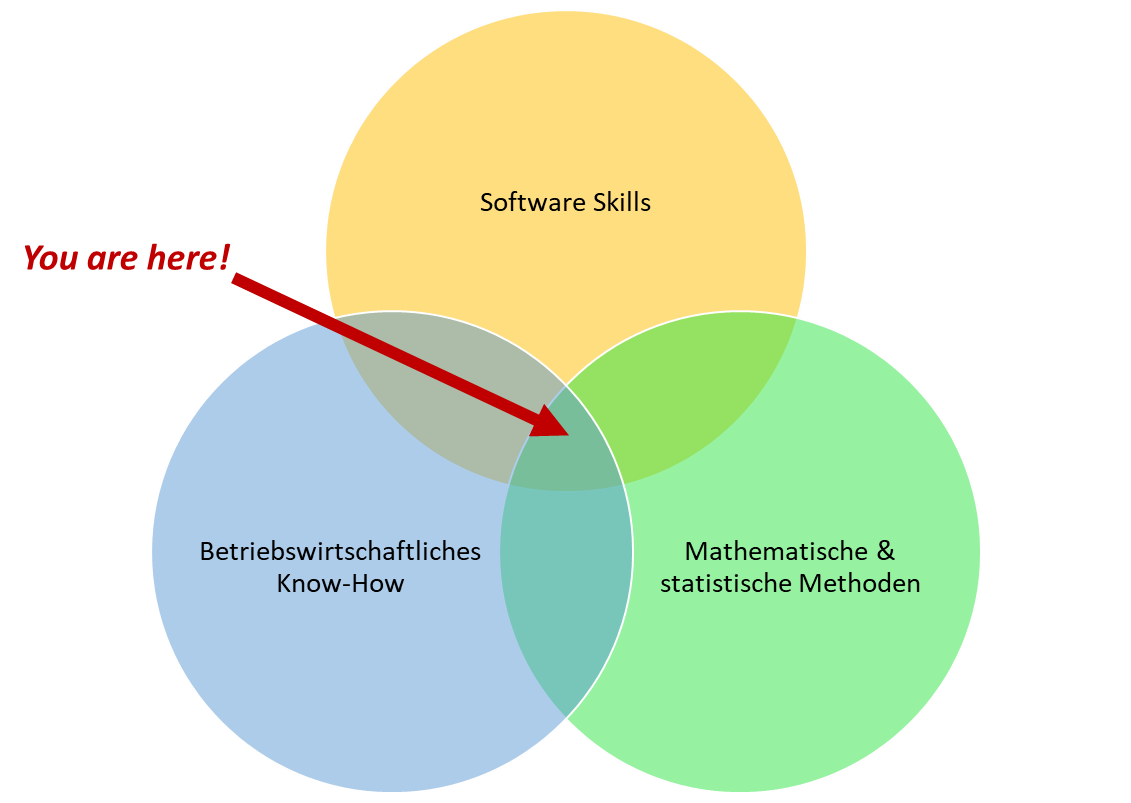What does an email spam filter have in common with a credit score analysis? How do the recommender systems of the large online stores function? And what risk do highly fluctuating resource prices pose to my company's success?
These are just three of countless examples from the specialization, Quantitative Methods and Risk Assessment. The core skill of this specialization is:
"Learning how to translate corporate data into information that can then be used to drive business success."

Why study the specialization Business Analytics?
Are you interested in human resources? Or is logistics your thing? Or do you enjoy the area of marketing and pricing? Nowadays, all business sub-areas are united by the same challenge: accumulated data needs to be analyzed in a well-founded manner to support business decision-making processes.
Create your individual portfolio of business subjects, acquire methodological expertise and learn one or two programming languages which will enable you to implement operational data analysis.
FAQ
-
Where are these skills needed?
In management consultancies, in banking and insurance, the telecommunications sector, in manufacturing companies, and ... and ... and. Wherever data is generated, there is also a need for specialists who can analyze this wealth of data. With increasing networking and digitization in the future, the amount of data will increase even further, as will the need for trained specialists. The only possible answer to this question is a counter question: Where will theses skills not be needed in the future?
-
Do I have to do a lot of math? Does the program co
Yes and no! Of course, the computer will do the actual calculations. However, to be able to understand the content of data analysis including the statistical methods used in calculations, a certain knowledge of abstract representations is necessary. After all, you need to know what the results mean. The prerequisite here is not so much school mathematics but rather the ability to abstract.
-
How is the degree program structured?
As shown in the diagram above, this specialization consists of three building blocks. You can, broadly speaking, put together the business component from a large number of elective modules according to your own preferences. There is, however, a certain framework defined by the degree program regulations; for example, you must take economics and law subjects. At the beginning of your program, you should take one or two introductory classes in programming. In these classes, you will learn how to use software architecture, which will be a part of the ongoing course of studies. After the first year of the program, you are ready to build upon your analytical skills. You can choose from a number of elective modules specific to your specialization.
Modules of the specialization
-
Multivariate statistische Methoden
In this module, students learn a number of multivariate statistical methods and typical use cases for them. Students will develop the skills needed to determine an applicable method for a quantitative problem, perform the analysis and interpret the results.
-
Computer-Intensive Methods
Computer-intensive methods are used for problems with high computational complexity. The aim of this module is the application of these methods to concrete problems and data sets with the statistical software R. Areas of application include, on the one hand, many topics of the so-called Industry 4.0, such as smart manufacturing, predictive maintenance, supply chain management or optimized energy management, and, on the other hand, classic areas such as market research and marketing.
-
Ökonometrie / Zeitreihenanalyse
Students will learn to transform an economic issue into an econometric model and to empirically test the resulting conclusions. The generation of hypotheses including both the evaluation and interpretation of estimates will be demonstrated using appropriate examples. This module also includes a practical computer component in which students will directly apply the lecture content to the analysis of data sets using statistical software.
-
Operations Research
Students will learn to mathematically represent production processes using graphs and to analyze such processes mathematically. The module introduces various algorithms and methods which allow process flows to be analyzed in more detail and, if necessary, to uncover weak points in such processes to then optimize them in a next step.
-
Digitale Datenverarbeitung
In this module, students will acquire professional skills in applying and developing digital computing in organizations.
-
Einführung in R
Students learn the basics of the statistical software R. Starting with calculator functions, students learn to create their own objects and graphs through exercises. The design of graphics will be further intensified using ggplot.
-
Systeme für fortgeschrittene Datenanalyse
Students will deepen their knowledge in software environments for data analysis. They will learn to transform unstructured raw data into an analyzable database and will then perform their own statistical analyses with this database.
-
Prognose und Simulationen
In this module, students will learn alongside basic programming skills in R the simulation of different distributions commonly used in the modelling of risk and process flow disturbances. This module also introduces several stochastic algorithms which have proven useful in professional practice.
-
Digitale Ökonomie
Digital markets are typically organized as platforms and take advantage of network effects. Whilst traditional pricing strategies often do not apply to digital products, digitization can, nevertheless, provide insights into customer structure that rarely exist in traditional markets.
-
Risk Assessment in Non-Life Insurance
In this module, students will learn to model insurance claims. The composite distributions used for the purposes of modelling are, however, not always explicitly computable. In such cases, students will learn to apply Monte Caro simulations to simulate the distributions. In case of parameterized computable distributions, the corresponding parameters will be estimated.
-
Risk Assessment in Life Insurance
Students will learn the classical modeling approaches of survival analysis based on Excel and R-based present value calculations.
-
Numerical Methods for Risk Assessment
This module begins by introducing various numerical approximation methods. Commencing with the secant and gradient method, we will then discuss Newton's method – as well as refinements to these methods – including, with the use of examples, an examination of the sensitivity of such solutions under exogenous parameter variation.
-
Seminar Datenschutz und Datensicherheit
Students will receive an introduction to the topics of data protection and corporate data security.

Anhalt University of Applied Sciences made it possible for me to have a personal dialogue with the lecturers and I was able to directly transfer my acquired knowledge to projects with my practice partners.
Andreas Sichmund, former student at the Department of Economics
Degree programs with top scores
Germany's largest university ranking service (CHE) certifies that the Department of Economics has top scores in the categories of “contact with work environment”, “international orientation” and “organization of studies”.
The state university Anhalt University of Applied Sciences offers you:
- low tuition fees
- highly recognized degrees
- accredited degree programs
Attractive student life
Bernburg's beautiful historic center
A unique campus with university buildings and residence halls. The beautiful historical city with the castle directly on the Saale River. In addition, the city is full of green spaces with perennial gardens and plants. The Bernburg-Strenzfeld campus stands out with its high quality of life and studies.
Read moreWe offer a wide range of sporting activities
Be it at the numerous sports facilities, such as in the sports hall or in the fitness studio or sauna, be it alone or in a team, whether Zumba, Yoga or floorball, there is a wide range of sports activities to discover all over the campus. Everyone can enjoy a fit and healthy student life with us!
Read morePreparation for starting a career
To prepare for a career start, the Career Service of Anhalt University of Applied Sciences offers free workshops, training, lectures and consultations. In addition, advantageous collaborations with important partners both within and outside the university are available.
Read more